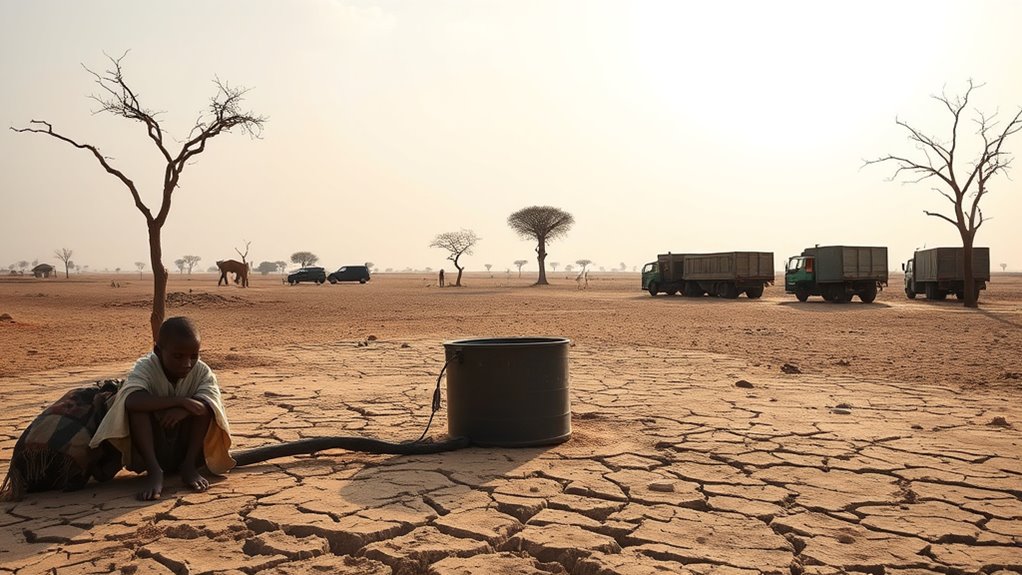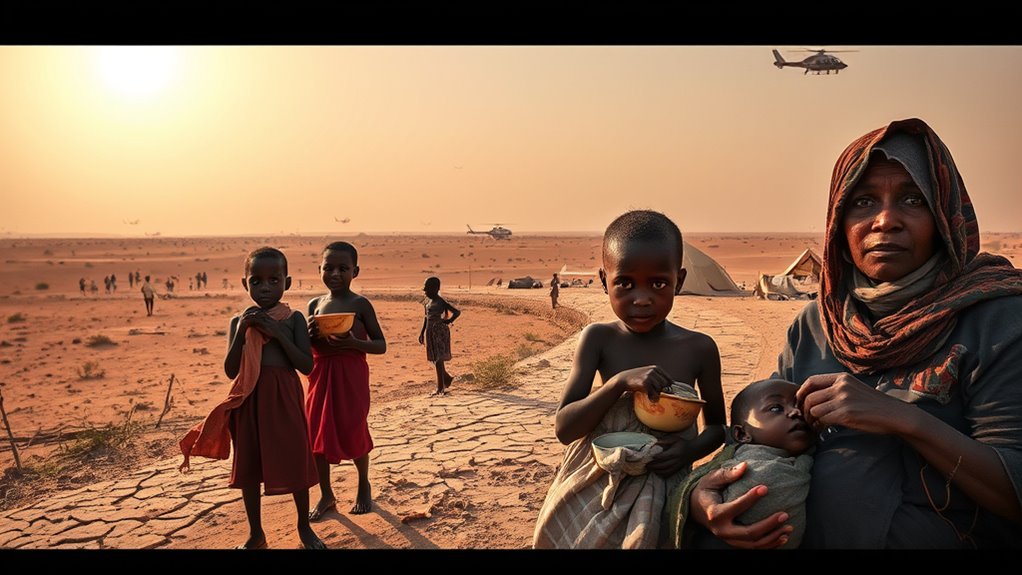The ongoing famine in Sudan results from years of conflict, political instability, environmental degradation, and economic struggles that disrupt farming and food supplies. Civil war and displacement prevent communities from planting and harvesting crops, while droughts and land degradation worsen food shortages. International efforts work to deliver aid, but logistical challenges and ongoing violence slow progress. Understanding these intertwined causes can help you see why lasting solutions require addressing both immediate needs and root issues. Keep exploring to learn more.
Key Takeaways
- The Sudan famine is driven by decades of conflict, displacement, and land degradation harming agricultural productivity.
- Environmental issues like drought, desertification, and climate change worsen land fertility and food security.
- Economic instability, inflation, and disrupted markets limit access to food for vulnerable populations.
- Humanitarian organizations face logistical and security challenges in delivering aid to displaced and affected communities.
- Addressing root causes through peace negotiations and systemic reforms is essential for long-term famine mitigation.

What led to the devastating famine in Sudan? You need to understand that a combination of long-standing conflicts, political instability, and environmental challenges has created the perfect storm. Decades of civil war, especially between the government and various rebel groups, have repeatedly disrupted agricultural activities and displaced millions of people. These conflicts make it impossible for communities to plant, tend, or harvest crops, leading to food shortages that worsen over time. Additionally, political upheavals and fragile governance structures hinder effective responses to these crises, leaving vulnerable populations without adequate support or resources. The ongoing power struggles and leadership disputes have diverted attention and funds away from essential services like food security, health, and infrastructure.
Long-standing conflicts and political instability have severely disrupted agriculture and displaced millions in Sudan.
Environmental factors have also played a significant role. Sudan’s arid climate, recurrent droughts, and desertification have reduced the land’s fertility and water availability. These conditions make farming unpredictable and less productive, especially for smallholder farmers who rely heavily on rain-fed agriculture. Overgrazing and deforestation further degrade the land, decreasing its capacity to sustain crops and livestock. Climate change has intensified these issues, causing irregular rainfall patterns and rising temperatures that threaten the very foundation of food production. When combined with ongoing conflict, these environmental stresses leave entire communities unable to grow enough food to meet their basic needs. Moreover, the degradation of land resources exacerbates food insecurity, making recovery more difficult.
Economic instability compounds the problem. Sudan’s economy has been weakened by sanctions, oil crises, and economic mismanagement, which limit people’s purchasing power and access to food. Inflation skyrockets, making even staple foods unaffordable for many families. Market disruptions prevent food from reaching those who need it most, and shortages become more acute. Internally displaced persons and refugees often end up in overcrowded camps with minimal food supplies, relying heavily on international aid. The lack of infrastructure, such as roads and storage facilities, hampers the distribution of food aid and supplies, further deepening the crisis. Effective food distribution systems are critical to reaching vulnerable populations and alleviating shortages in the short term.
You should also recognize that international actors have tried to respond, but challenges remain. Humanitarian organizations work tirelessly to deliver aid, but ongoing conflict and logistical hurdles slow down relief efforts. Political negotiations continue to aim for peace, which is vital for long-term stability and food security. However, until the root causes—conflict, environmental degradation, and economic instability—are addressed, the cycle of famine persists. The situation demands a coordinated effort that tackles both immediate needs and the underlying issues that keep Sudan trapped in this humanitarian crisis.
Frequently Asked Questions
How Is Climate Change Impacting Sudan’s Food Security?
Climate change worsens Sudan’s food security by causing unpredictable rainfall and prolonged droughts, making farming unreliable. You might find crops failing and water sources drying up, forcing communities to struggle for basic sustenance. Rising temperatures also increase pests and disease, further damaging crops. These changes push farmers to the brink, reduce food availability, and deepen hunger. Without urgent action, climate impacts will continue to threaten Sudan’s ability to produce enough food for its people.
What Role Do Local Communities Play in Famine Relief Efforts?
You play a essential role in famine relief efforts, as local communities often provide 60% of aid distribution and food security initiatives. You organize local resources, share knowledge, and mobilize volunteers to reach those in need quickly. Your involvement helps build resilience and guarantees aid reaches the most vulnerable. By working together, you can considerably reduce hunger and save lives in Sudan’s crisis.
Are There Any Long-Term Solutions to Sudan’s Recurring Famines?
Yes, long-term solutions include investing in sustainable agriculture, improving water management, and building resilient infrastructure. You should support policies that promote economic stability and peace, as conflict worsens food insecurity. Encouraging local empowerment and education helps communities adapt to climate challenges. International collaborations can fund these initiatives, ensuring that Sudan’s future food systems are more resilient. Your involvement and advocacy can push for sustained efforts that address the root causes of recurring famines.
How Does Regional Conflict Exacerbate the Famine Crisis?
Regional conflict worsens Sudan’s famine crisis by disrupting food production, destroying crops, and displacing communities. When fighting erupts, you see supply routes cut off, making it hard to get food and aid to those in need. Conflict also weakens local economies, reducing farmers’ ability to grow food. As a result, scarcity grows, prices rise, and vulnerable populations face increased hunger and malnutrition.
What Is the Current Status of International Aid Delivery?
Right now, international aid delivery in Sudan faces significant challenges due to ongoing conflict, logistical issues, and safety concerns. Aid organizations are working tirelessly to reach affected regions, but access remains limited, and supplies are often delayed or disrupted. You can help by supporting reputable charities and spreading awareness. Your efforts can make a difference in ensuring essential aid gets through to those desperately in need.
Conclusion
As you witness the barren fields and starving children, remember that while conflict and climate change threaten Sudan’s future, international aid offers a flicker of hope. The contrast between devastation and aid highlights your power to support change. By raising awareness or donating, you become part of the solution, turning despair into resilience. Together, you can help transform Sudan’s suffering into a story of recovery and hope amidst the chaos.










